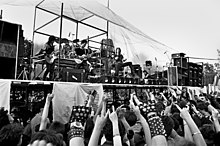Roko maršas
They became part of the Singing Revolution, spreading ideas of the Lithuanian independence movement among the youth.
[2] The festivals became a rehearsal for the mass protest rallies by the Sąjūdis that lead to the restoration of Lithuania's independence in March 1990.
[3] The idea for the festival was raised by Algirdas Kaušpėdas, leader of the band Antis, after a successful concert Kažkas atsitiko (Something Happened) in 1986.
Released the disc Roko maršas per Lietuvą '89 (Rock march through Lithuania '89) which contained the following songs: Aš gimsiu rytoj (I Will Be Born Tomorrow) by Foje, Lietuva yra OK (Lithuania Is OK) and Ašarėlė (Little Tear) by Naujas kraujas, Kodėl?
), Kaime (In A Village), and Kareivėli ([To] Little Soldier) by Edis Punkris Band, Aš žinau (I Know) and Tik po audros (Only After Storm) by Dainava, Lietuvos valstybė (State of Lithuania) by Antis.




